
Iliad: The Most Renowned War Legend is a board wargame published by the Italian game publisher International Team (IT) in 1979 that simulates the siege of Troy as described in Homer's Iliad .

Iliad: The Most Renowned War Legend is a board wargame published by the Italian game publisher International Team (IT) in 1979 that simulates the siege of Troy as described in Homer's Iliad .
As described in Homer's Iliad, Paris of Troy kidnapped Helen, daughter of Menelaus and took her to Troy. Menelaus gathered an army and besieged Troy for nine years. Then disputes arose between the Greek kings Agamenon and Achilles, and Achilles withdrew from the siege.
Iliad is a two-player board wargame in which one player controls the Greek besiegers, and the other controls the Trojan defenders. The game simulates the four days of battle described in Homer's ode following the departure of Achilles. [1]
The boxed set comes with a hex grid game board, 51 counters divided between Greek and Trojan heroes, and a 10-page rulebook written in Italian, with English, French and German translations. [1]
Complexity of play was rated by the publisher as Level 1 (the least complex). Critic Tom Oleson noted, "Because of its simplicity, Iliad is only useful as an introductory game."
Iliad was designed by Marco Donadoni, and published by IT in 1979 with box cover art by Enea Riboldi.
Although Game Designers' Workshop had published a game titled Iliad the previous year, the two games are not related.
In Issue 22 of Fire & Movement , Tom Oleson thought the best thing about the game was "its superlative appearance, among the most striking of all wargames." However, Oleson found the game was too long despite its simplistic rules, often running four to five hours. Oleson also noted, "although the rules are short and unsophisticated, they are riddled with ambiguities ... One of the key ambiguities concerns Achilles’ possible entry in an emergency." Oleson concluded, "This game is interesting as an example of the 'state of the art' in Italy, not for purchase and repeated play. If I were stranded on a desert island with Iliad, I'm sure I could play it many times with enjoyment — but it certainly wouldn't be on my list of games to take with me to that island, even if the list had 100 places." [3]
In a retrospective review in Simulacrum written over twenty years after the game's publication, Joseph Scoleri commented, "While the IT games are notable for their polished components, many of them also became notorious (to English readers) on account of their rulebooks written in Italian, English, French and German. The English translations are renowned for being poorly done." Scoleri noted that the game had been relatively expensive (US$34.95) when it was first published, writing "Iliad did not offer much gameplay for your dollar — especially when you consider that it sold for almost $8 more than games such as SPI's NATO Division Commander (a 1200 counter wargame which offered hour after hour of game play)." [1]
At the 1979 Origins Awards, Iliad was a finalist for a Charles S. Roberts Award in the category "Best Fantasy/Futuristic Board Game of 1978". [4]

In Greek mythology, Hector is a Trojan prince, and a hero and the greatest warrior for Troy during the Trojan War. He is a major character in Homer's Iliad, where he leads the Trojans and their allies in the defense of Troy, killing countless Greek warriors. However, he is ultimately killed in single combat by the Greek hero Achilles, who later drags his dead body around the city of Troy behind his chariot.

The Trojan War was a legendary conflict in Greek mythology that took place around the 12th or 13th century BCE. The war was waged by the Achaeans (Greeks) against the city of Troy after Paris of Troy took Helen from her husband Menelaus, king of Sparta. The war is one of the most important events in Greek mythology, and it has been narrated through many works of Greek literature, most notably Homer's Iliad. The core of the Iliad describes a period of four days and two nights in the tenth year of the decade-long siege of Troy; the Odyssey describes the journey home of Odysseus, one of the war's heroes. Other parts of the war are described in a cycle of epic poems, which have survived through fragments. Episodes from the war provided material for Greek tragedy and other works of Greek literature, and for Roman poets including Virgil and Ovid.
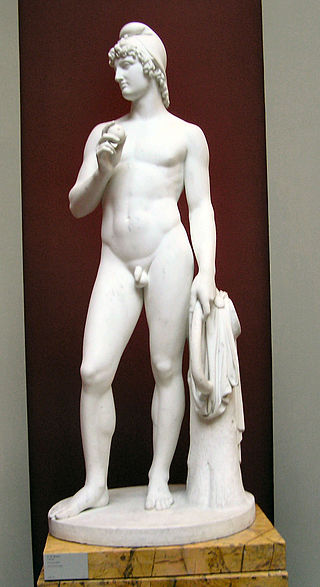
Paris, also known as Alexander, is a mythological figure in the story of the Trojan War. He appears in numerous Greek legends and works of Ancient Greek literature such as the Iliad. In myth, he is prince of Troy, son of King Priam and Queen Hecuba, and younger brother of Prince Hector. His elopement with Helen sparks the Trojan War, during which he fatally wounds Achilles.

Helen, also known as Helen of Troy, in Latin as Helena, beautiful Helen, Helen of Argos, or Helen of Sparta, was a figure in Greek mythology said to have been the most beautiful woman in the world. She was believed to have been the daughter of Zeus and Leda, and was the sister of Clytemnestra, Castor and Pollux, Philonoe, Phoebe and Timandra. She was married to King Menelaus of Sparta "who became by her the father of Hermione, and, according to others, of Nicostratus also." Her abduction by Paris of Troy was the most immediate cause of the Trojan War.
In Greek mythology, Deiphobus was a son of Priam and Hecuba. He was a prince of Troy, and the greatest of Priam's sons after Hector and Paris. Deiphobus killed four men of fame in the Trojan War.

Troy is a 2004 epic historical war film directed by Wolfgang Petersen and written by David Benioff. Produced by units in Malta, Mexico and Britain's Shepperton Studios, the film features an ensemble cast led by Brad Pitt, Eric Bana, Sean Bean, Brian Cox, Brendan Gleeson and Orlando Bloom. It is loosely based on Homer's Iliad in its narration of the entire story of the decade-long Trojan War—condensed into little more than a couple of weeks, rather than just the quarrel between Achilles and Agamemnon in the ninth year. Achilles leads his Myrmidons along with the rest of the Greek army invading the historical city of Troy, defended by Hector's Trojan army. The end of the film is not taken from the Iliad, but rather from Quintus Smyrnaeus's Posthomerica, as the Iliad concludes with Hector's death and funeral.

Hitler's War is a strategic level World War II war game for 2 or 3 players, first published by Metagaming Concepts in 1981, and then by Avalon Hill in 1984.
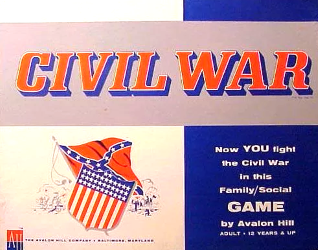
Civil War is an early strategic board wargame published by Avalon Hill in 1961 that simulates the American Civil War. Unlike other games produced by Avalon Hill during this period such as Gettysburg, Civil War did not sell well and was dropped from production two years later.

Cry Havoc is a board wargame published by Standard Games and Publications in 1981 that uses a complex set of rules to simulate medieval one-on-one combat.
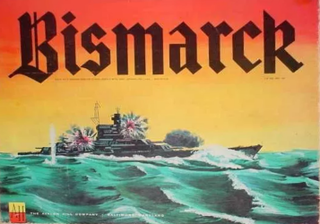
Bismarck is a board wargame published by Avalon Hill in 1962 that simulates the hunt for the Bismarck.

The Iliad is one of two major ancient Greek epic poems attributed to Homer. It is one of the oldest extant works of literature still widely read by modern audiences. As with the Odyssey, the poem is divided into 24 books and was written in dactylic hexameter. It contains 15,693 lines in its most widely accepted version. Set towards the end of the Trojan War, a ten-year siege of the city of Troy by a coalition of Mycenaean Greek states, the poem depicts significant events in the siege's final weeks. In particular, it depicts a fierce quarrel between King Agamemnon and a celebrated warrior, Achilles. It is a central part of the Epic Cycle. The Iliad is often regarded as the first substantial piece of European literature.

To the Green Fields Beyond, subtitled "The Battle of Cambrai, 1917" is a board wargame published by Simulations Publications, Inc. in 1978 that simulates the appearance of tanks for the first time during the First World War.
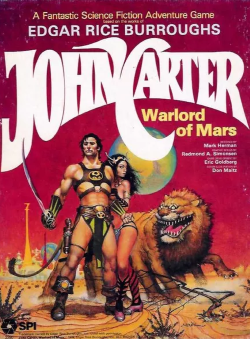
John Carter: Warlord of Mars is a two-player board game published by Simulations Publications, Inc. (SPI) in 1979 that is based on the Barsoom novels of Edgar Rice Burroughs featuring the hero John Carter.

Europe Aflame is a board wargame published by TSR in 1989 that simulates the European and Middle East theatres of World War II.

Arcola, The Battle for Italy 1796 is a board wargame published by Operational Studies Group (OSG) in 1979 and republished by Avalon Hill in 1983 that is a simulation of the Battle of Arcola between French and Austrian forces in 1796. The game was designed to tempt players to purchase OSG's previously published and larger wargame Napoleon in Italy.

The Game of France, 1940: German Blitzkrieg in the West, originally titled "The Battle for France, 1940", is a board wargame originally published by Simulations Publications Inc. (SPI) in 1971 that was subsequently re-issued by Avalon Hill in 1972. Both editions simulate the World War II Battle of France in 1940, when the German blitzkrieg offensive overwhelmed French and British defenses in northern France.
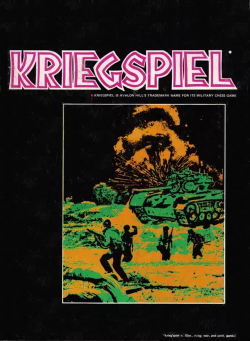
Kriegspiel is a board wargame published by Avalon Hill in 1970 that simulates a hypothetical war between two nations. Although the simple game sold well to new players, it received negative reviews by more experienced gamers.

Eagle Day: The Battle of Britain is a board wargame published by Histo Games in 1973 that simulates the Battle of Britain. Reviewers noted its marked similarity to previously published wargames The Battle of Britain, and Luftwaffe, but found Eagle Day to be inferior to both.
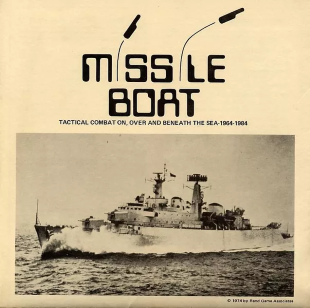
Missile Boat, subtitled "Tactical Combat On, Over and Beneath the Sea 1964-1984", is a board game published by Rand Game Associates (RGA) in 1974 that simulates naval combat using ships and weaponry from the mid-1960s to the mid-1980s.

Close Assault: A Man-to-Man Game of Squad Tactics and Command - Europe 1939–1945 is a board wargame published by Yaquinto Publications in 1983 that simulates squad-level combat during World War II.